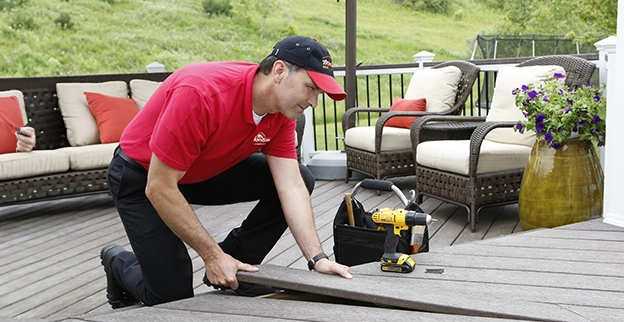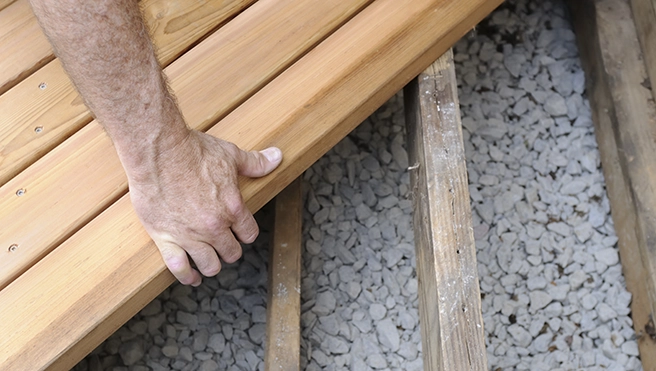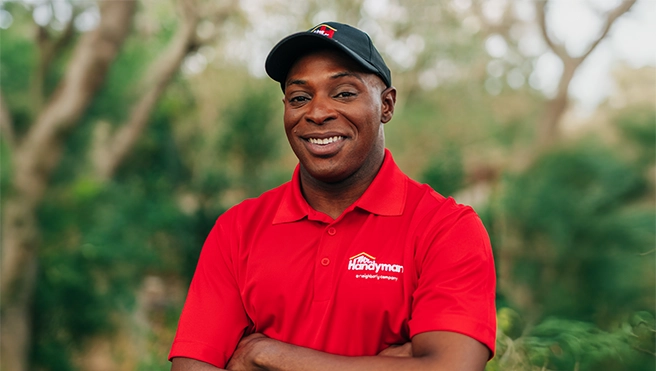Wood is the most popular deck material for modern homeowners. But the beauty of the decking structure is that it's not mandatory to pledge to just one material, and you can get creative on how you encircle your outdoor living space around your home. While concrete is a common front porch style, cedar wood or pressure-treated wood is the common kind for backyard decks. Whichever type of material you opt for will determine how much maintenance effort you have to invest in it.
Some of the most common materials we encounter during Vancouver deck repair projects include:
Wood/Pressure-Treated Wood: Pressure-treated wood is the wood material found in most Vancouver houses as it is resistant to wood rot and lasts longer than purely organic and natural wood, which is not treated or artificially engineered. Because of this, unlike real wood, it won't burn down as easily when exposed to fire, is pest-resistant, and bodes well in moisture-prone areas. But it's still not entirely foolproof and still susceptible to harsh direct sunlight exposure and will, as a result, crack, split, and discolor if it's not regularly stained, painted, or otherwise sealed during a service for deck repair in Vancouver, WA.
Cedar Wood: Cedar wood is durable, can handle fluctuating temperatures, is not susceptible to moisture damage and so won’t warp or splinter easily, and has lesser maintenance given that it is readily resistant to wood rot and insect infestation. Given the added benefits, it is more expensive to install, can potentially fade out and pale over the years if it's not occasionally cleaned, and is easily scratched if you move heavy furniture across its surface or by your pet’s claws, which will require a Vancouver deck repair service to properly fix.
Red Wood: Just as sturdy as its wood predecessors, redwood is also durable, resistant to insects, fire, and rot, and doesn’t crack or warp easily. Its rustic appeal due to its natural wood grain provides a warm aura, given its texture and reddish tone. But you do have to be consistent with regular maintenance if you want to retain the redwood's vibrant color and prevent it from fading away. Redwood also doesn’t bode well in heavy amounts of pressure and can dent easily if you are lugging around heavy furniture or sports equipment across its surface. In that case, you will need to sign up for a Vancouver deck repair, given redwood is more vulnerable to being scrapped.
Aluminum: Despite most requests for wooden decks, others want a change of pace and swap for another unique material. Aluminum is also durable and lightweight and won’t crack or fracture easily; plus, it's resistant to mold. Plus, you’ll save in terms of maintenance costs; although it requires a good scrub here and there, you don’t need to waste time painting or staining it, unlike wood. It can, however, be noisy under heavier amounts of pressure, especially under constant foot traffic, and be a possible safety hazard during the winter as its surface glazes over and becomes slippery once exposed to ice.
Steel: Another unique material for decks, steel is incredibly durable, does well against moisture damage, is resistant to fire, can handle fluctuating temperatures and withstand heavy amounts of pressure, and probably makes its aluminum-based counterpart seem lame in comparison. But buyer beware, you must be keen about picking up the extra chore of cleaning via power washing to scrub off all the accumulated dirt and debris and any lingering residue left behind over time can result in discolored rust on its surface and eventual corrosion of its structure. And so, although steel seems like the most resilient option, it has its weakness as a steel deck can potentially begin to leak, which of course, can be fixed with a deck repair in Vancouver, WA. You can discuss all these pros and cons with our Vancouver deck repair experts during your no-obligation consultation appointment.
Fiberglass: Probably the most elegant decking material, fiberglass is lightweight, waterproof and reflects light much better than other deck materials, and has less maintenance. If anything, fiberglass bolsters the aesthetic appeal of your home. The only downside is that if it happens to have a hairline crack or fracture, it cannot easily be repaired with a Vancouver deck repair service, at the risk of looking makeshift. Our expert handyman can, however, do their best to perform minor mends with fiberglass epoxy resin using a plastic applicator if you can accept that your fiberglass deck won’t be the same as its original condition.
Vinyl: Plastic is the entry-level choice for most home remodels simply because it's so versatile. Vinyl won’t easily warp, can withstand pressure and fluctuating temperatures, and, best of all, can be customized with fun colors and designs. It can mimic real wood and showcase its authentic appeal without actually being the real thing. But please note it's expensive to install, and any needed Vancouver deck repairs are difficult to do, as the plastic itself cannot be refinished as it's not an organic material. Plus, it's not environmentally friendly and any chipped-off pieces will not biodegrade and decompose but instead pollute the environment.



